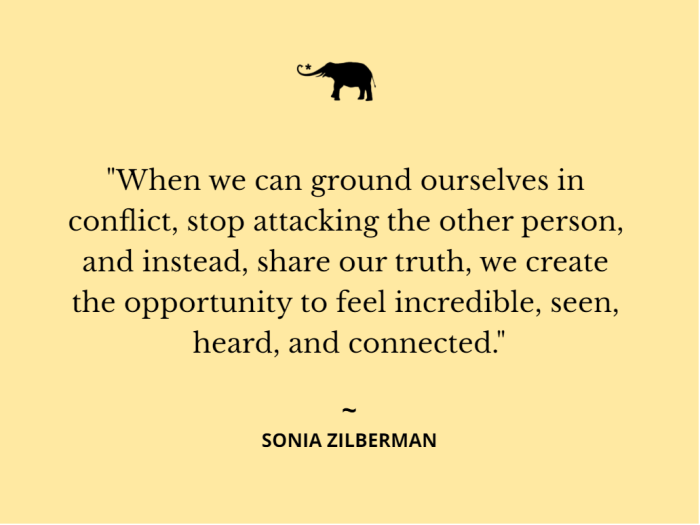Back in the day, before I started my journey in conscious relating, my conflicts used to look something like this:
Me: “You did x, and now this bad thing happened! If you hadn’t done x, I wouldn’t be feeling this way. It’s your fault!”
Them: “It’s not my fault that this happened. It’s your fault! Here’s the reason [passionately try to convince me of the reason] why it’s your fault! I’m right and you’re wrong.”
Me: “No…I’m right and you’re wrong.”
Them: “No…I’m right and you’re wrong. This always happens like this [insert historical examples of everything, including the kitchen sink that’s been wrong].”
Me: “But…you always (or never) do [insert the repeating problem in the relationship with the other].”
Cue the escalation of tone, pitch, and maybe throw in some nuclear bombs of hurtful things said by both parties.
Welcome to the “fight” version of the fight-or-flight response to threat.
Reconciliation, in this case, often involves a lot of circular explanations. One party may have to admit fault, in part to avoid more a boring discussion, just get over it, and move on.
Alternatively, the script could have gone like this:
“I feel there is a conflict over something that happened, but I don’t want to get into it, as it will lead to the above fight, so I will distance and do my thing, and I’ll keep it all inside.”
This is the “flight” scenario.
The Me and Them are fully interchangeable.
If you can relate to this dynamic, you may relate to the fact that this game of blame and shame creates distance, and it feels more like a heated tennis match with an opponent rather than a connected relationship. Separate teams.
Conflict in relationships is inevitable. When two people, with different pasts, experiences, and filters on the world come together, even the most aligned of perfect “twin flames” will come into conflict. It’s normal.
If done consciously, conflict can be an incredibly healing process, leading to both parties feeling seen and heard, connected, and on the same team to solve the problem together. Conflict can strengthen the bond and intimacy, and everyone can come out having their feelings met.
Or, it can lead to exasperation in the futile effort to prove a point, fueling greater distance, feelings of despair, and emotional dysregulation with the opponent. This scenario becomes a zero-sum, sleeping-with-the-enemy type of situation.
Whether we use conflict to strengthen our bond and intimacy—or grow apart—is up to us.
Here are five ways to show up in a conflict and get your needs met, feel heard, and be connected with your partner:
1. Ground. Ground. And ground again.
Grounding may be the most important thing one can do in conflict. It helps us stay present with what is, instead of looping into triggering stories of the past or the future. By feeling our bodies, we are better equipped to feel our feelings, and respond rather than react to our partners.
The best way to ground is to consciously breathe. Breathe deeply and feel the body. Feel the bottoms of the feet firmly on the ground, and the hands while breathing. Maybe it would help to hold your heart, or your belly, or your throat area—wherever there is tightness. Staying embodied allows us to regulate our nervous system, without losing control and escalating the conflict into nuclear mode.
2. Repeat what you heard your partner say, and ask them to do the same.
Not your interpretation of what they meant to say, but actually the exact words that came out of their mouth. It can go like this: “I hear you when you said [regurgitate the exact thing they said]. Did I get that right?” If they correct you, repeat back the correction.
Ask your partner to do the same for you.
This simple exercise goes a long way for allowing both parties to feel seen and heard in their truths. When we feel seen and heard, we feel safer, more grounded, and connected. We can escape our triggered loops of trying to prove our point, and actually focus on problem-solving. You’d be surprised how beneficial this can actually be.
3. Talk about your feelings.
Our primary feelings of anger, sadness, fear, and joy help us tap into our needs and show up in our authentic truth. “I feel that you did x, y, z…” is not talking about feelings; that’s the old blame game.
“I’m scared,” for example, is a truth one cannot argue with. Identifying our primary feelings before reacting to them is the hard part. Oftentimes, it is hard to tap into our feelings, and much easier to blame the other for our discomfort.
Something they did made me feel like this. They need to change so I feel better. But that is a trap, a bottomless bucket that cannot be filled.
Turning inward and tapping into our primary feelings are hard and make us feel vulnerable and unsafe. But if we want to rewire our old patterns, we need to feel those places and communicate them to our partners without blame, shame, or guilt.
4. Speak from the “I” and refrain from blame, shame, or guilt.
And that goes for directing those emotions both at you and your partner. No one is bad. No one wants to feel like they are bad. Everyone has their own version of reality.
If we can speak about our experience and not make the other “bad,” we can go a long way to feel close and connected to our partner and get our needs met. When we make the other “bad,” it pushes them, even if subconsciously, into a defensive position.
“But I’m not bad,” which is then probably followed by their version of “You are bad!”
Speaking from our own experience with “I” statements allows for more space to be created. More connection and curiosity. There is no attack; there is simply sharing.
5. Cool off.
If you are feeling desperate that the conflict is going nowhere and is turning into a match-off, take a time out. Get out of the house and go for a walk. A change of scenery combined with physical activity for just 20 minutes will allow your brain to switch from the “survival mode fight-or-flight” reaction in the amygdala part of your brain, to higher function, clear thinking in the frontal lobes.
In these 20 minutes, your brain activity starts problem-solving instead of surviving. The brain parts that deal with empathy, reason, and curiosity come back online, and we can again harness our capacity to feel love and connection with our partner.
When we can ground ourselves in conflict, stop attacking the other person, and instead, share our truth, we create the opportunity to feel incredible, seen, heard, and connected. Of course, this starts with us being curious about the experience of the other.
Why did they have that experience?
What feelings are behind the mechanics of the conflict?
Is this a familiar or new place in the relationship?
When both parties feel seen and heard, the conflict can be a really intimate process. One that brings us closer rather than apart. And in this space, the actual problem-solving can happen in a way where everyone’s needs can be met.









Read 3 comments and reply